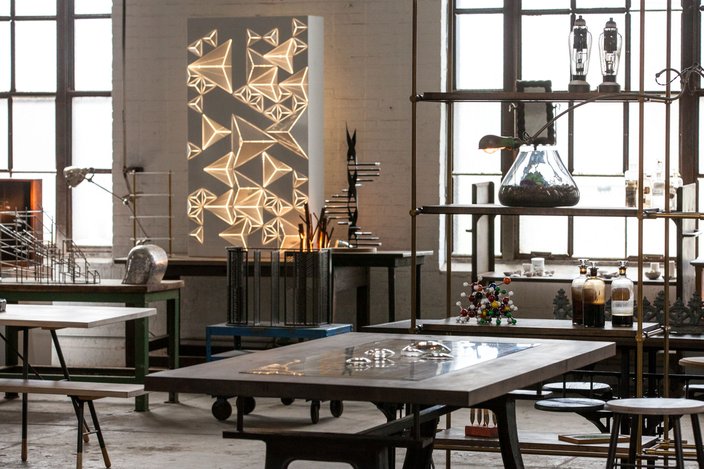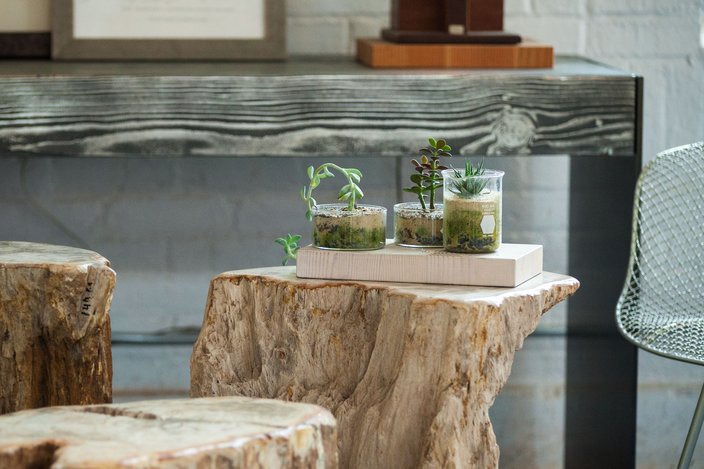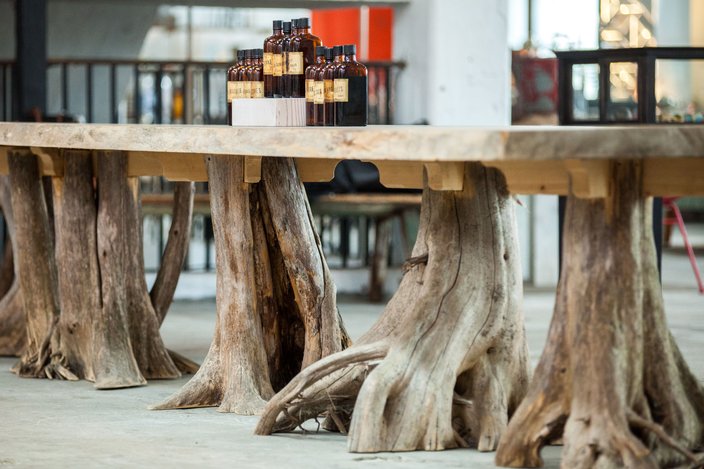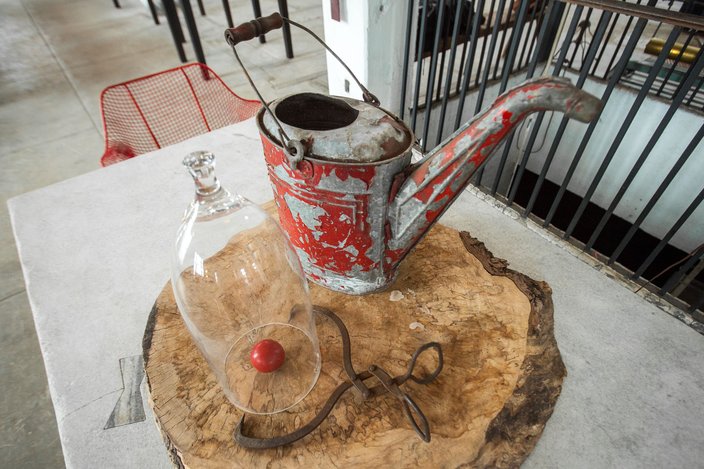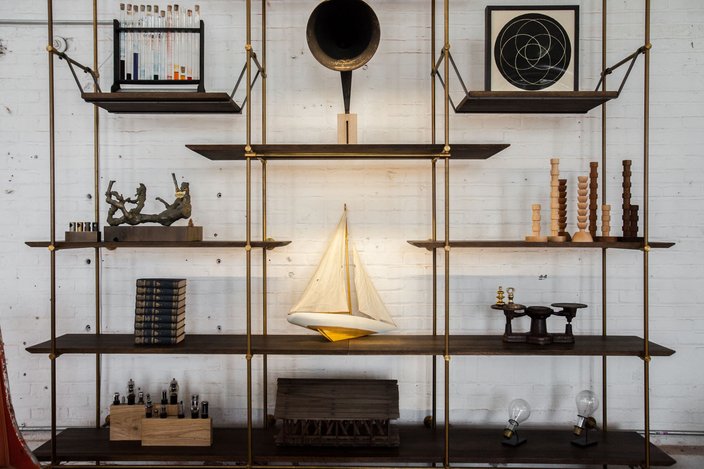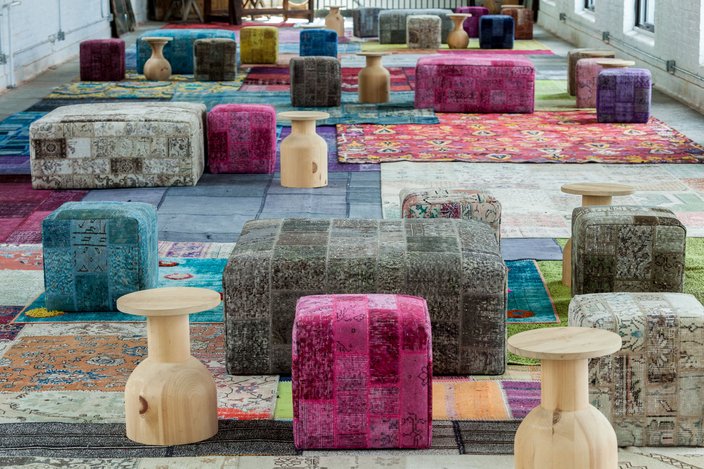
May 26, 2015
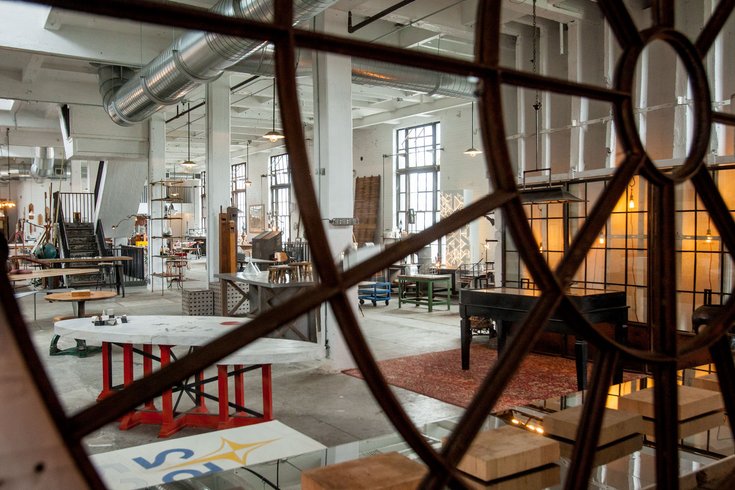 Thom Carroll/PhillyVoice
Thom Carroll/PhillyVoice
The main floor of American Street Showroom, seen from a reflection in a vintage window frame mirror.
Fortified by a steampunk warehouse exterior at 2201 N. American St., American Street Showroom is like Pinterest brought into the third dimension. It is, as Showroom Director Kim Kamens described it, a "3-D mood board."
The showroom is an outpost of Amuneal, a longstanding custom-fabrication and magnetic shielding manufacturer based in North Philadelphia that serves retail and hospitality industries, as well as architects. The company doesn't sell pre-made objects to individual shoppers but instead collaborates with brands and their designers to custom-make and -design furniture and fixtures for stores, hotels and, on occasion, public spaces. The showroom's purpose: Inspire clients to want more than what they came in with.
Filling the space, which is closed to the public, are projects of Amuneal and its co-curators Robert Ogden and Groundwork Home, in addition to dozens of one-of-a-kind collectibles plucked from flea markets across the country. In one corner is a chunk of a giant metal bench that currently resides in Trump's Taj Mahal, in another a duo of reclaimed wood tables twice-sprayed with bronze and brass metals, and hanging on the entrance wall is a taxidermy songbird wall collage dated to the Victorian era.
It's Epcot for designers -- full of tomorrow's marvels but jam-packed with the antiquities that first inspired them.
And, like Epcot itself, it was hardly an overnight build.
Between the windows is an assortment of scale models, made as prototypes for large-scale pieces. The tall, triangular wall fixture can now be viewed from atop the Reunion Tower in Texas. Other models can be found in their final form everywhere from Moscow, to Dallas, Texas, to Trump's Taj Mahal. Thom Carroll / PhillyVoice
Consider the showroom a byproduct of now-rare manufacturing success in Philadelphia. After all, it's not as if every manufacturer has the luxury of hosting clients in an 11,000-square-foot showroom.
What now embodies edgy and fabulous was once a far less glamorous producer of cathode ray tubes -- aka those electron-firing guns that once powered boob-tube TV sets.
The company was founded in 1965 by Harriet and Sy Kamens, parents of current CEO Adam Kamens (husband of Kim). In short, they were a penniless couple who launched their venture through a small business loan from the back of a 500-square-foot candy warehouse. Over time, they grew the business into a stable manufacturing plant of magnetic shielding.
In a twist of fate, the company went on life support after Sy Kamens died in 1986; Adam, only 15 at the time, didn't join the company until 1993, when it was barely sustaining. By 1998, he spearheaded an effort to reclaim the company as the custom-fabricator it is today.
"I was confident there were markets that could use a touch of things we could make but nervous that if something went wrong, it would be me to blame," Adam Kamens told PhillyVoice. "I didn’t want to be the one to kill the family business."
On the brink of death alongside every other manufacturer in the region during the '90s, the custom-design model lassoed the company back from the ledge and into the black.
Succulent plants sit atop found petrified wood tables in the foreground, with a metallized wood console table by Amuneal in the back. Thom Carroll / PhillyVoice
Within a year, the business's reach, said Kim Kamens, began to spread "like a virus" from a single interaction the company had with Barneys New York making hangers.
Impressed, Barneys promised to show the company the ropes in the retail world. A transient industry, employees from Barneys would leave and take the good word of Amuneal to other brands -- much to Amuneal's benefit.
"So much of our business we can trace back to Barneys, because all those people who were there, it's like, 'This person went to Calvin Klein, this person went to Alice and Olivia, this person went to Victoria's Secret' -- everyone in that industry changes jobs every few years, and the people under them remember us," she said. "They say, 'Oh, there's this great company in Philadelphia we can use.'"
Amuneal today employs 130 people -- a 10-fold growth since 1993 -- and operates three wood and metal shops out of North Philadelphia, where the company plans to stay. The client list includes Macy's, Saks Fifth Avenue, SoHo House Chicago, Gap, W Hotel, Anthropologie and more.
What ultimately makes Amuneal memorable, she said, is its ability to engineer a design with manufacturing in mind.
"Because we’re the manufacturer, we know how to make something and make the design in a way that is either cost-effective or might have a different manufacturing process that designers have never heard of," Kim Kamens said. "We can add a lot of value, in that way. And what happens, a lot of times, is the more we get involved with a client, the more they bring us in early in the [design] process."
A root-based table by the showroom's co-curator, Groundwork Home, a Philadelphia-based furniture manufacturer specializing in locally sourced and reclaimed materials. Thom Carroll / PhillyVoice
For example, when the company was tasked with creating two-dimensional metal tree cutouts for Trump, it knew the reality of the assignment was to find a way to make them for less money than competitors -- good business, to be sure, but not compelling for creative minds. Taking a more inventive approach, the company engineered the trees to be three-dimensional and have a bamboo aesthetic. Amuneal not only got the job (despite being pricier), but when Donald Trump himself noticed two of the trees on the wall at Taj Mahal, he requested hundreds more be incorporated. Here, in Philly, Amuneal has manufactured 1,000 of those fixtures.
The general idea, Kim Kamens said, is to -- when possible -- create objects for clients that will outlast them with materials that have already outlasted them. Because people today want to purchase furniture with history imbued in the wood grains.
A cross-section slab resting atop a reclaimed marble table from King of Prussia. The marble was stripped from Independence Mall as the marble aged and visitors complained of the slippery surface. Thom Carroll / PhillyVoice
"There's King of Prussia marble here that's far more expensive than marble we get from India, but there are clients who specifically want the KOP marble because the Founding Fathers walked on it," she said, referring to former Independence Mall marble that showroom collaborators Robert Ogden and Groundwork Home use in their work. "It has a history -- almost like an animal. It has a life; it had a life."
American Street Showroom, despite its hints of history and boutique-like setup, is neither a museum, nor a store. Instead, it teeters somewhere in the middle. It's a thought-provoking, motley collection of treasures you won't find dusting up the shelves of Pier 1 or lounging in display cases at the Art Museum.
But, sadly, they're also treasures that casual eyes are seldom treated to.
You won't be able to just waltz into the space for a tour on a Saturday afternoon; however, the Kamens said they are opening it up to more events -- weddings, receptions and artist meetings.
Still, knowing an air of exclusivity also adds to the appeal and keeps the space authentic, don't expect to book it half as easily as you would the Marriott.
"We like doing events that further our vision for the space. If someone’s torn between this space and a hotel and they only want to do it here for the easy parking, it’s not the right fit," Adam Kamens said. "But if someone’s enthusiastic about discovery, or the emotional connection to the space, or art, or design or the fashion world, it makes sense. And it dovetails nicely with how we envision the space and use it ourselves.”
Big picture, what does American Street Showroom's presence -- no matter how concealed -- say about Philadelphia?
“You never know what’s around the corner," Adam Kamens said. "In a city that’s not as big as it is geographically large, I’m always surprised by how many cool things are happening in these little nooks and crannies. Three-person shops, organizations starting, vibrant communities -- I think that, for us, it speaks a lot about what’s capable and what's happening in Philadelphia. There’s something gritty about Philadelphia in general, and I think that’s echoed in the space. It's gritty but beautiful; it's honest but authentic and romantic."
